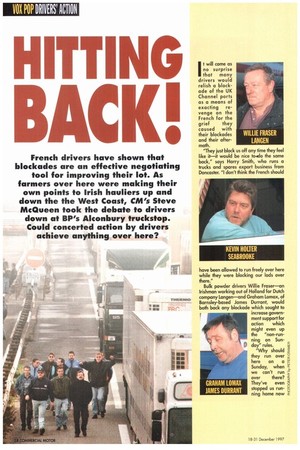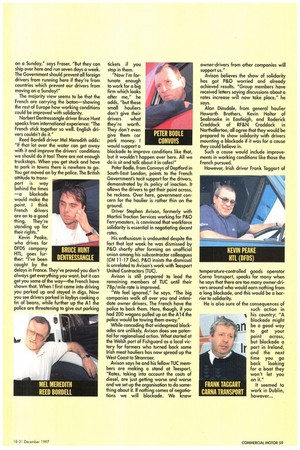VOX POP DRIVERS' ACTION
Page 60

Page 61

If you've noticed an error in this article please click here to report it so we can fix it.
HITTING BACK.
French drivers have shown that blockades are an effective negotiating tool for improving their lot. As farmers over here were making their own points to Irish hauliers up and down the the West Coast, CM'S Steve McQueen took the debate to drivers down at BP's Alconbury truckstop. Could concerted action by drivers achieve anything over here? It will come as no surprise that many drivers would relish a blockade of the UK Channel ports as a means of exacting revenge on the French for the
grief they caused with their blockades and their aftermath.
"They just block us off any time they feel like it—it would be nice to.do the same back," says Harry Smith, who runs a trucks and spares export business from Doncaster. "I don't think the French should have been allowed to run freely over here while they were blocking our lads over there."
Bulk powder drivers Willie Fraser—an Irishman working out of Holland for Dutch company Langen—and Graham Lomax, of Barnsley-based James Durrant, would both back any blockade which sought to increase government support for action which might even up the "non-running on Sunday" rules.
"Why should they run over here on a Sunday, when we can't run over there? They've even stopped us running home now on a Sunday," says Fraser. "But they can ship over here and run seven days a week. The Government should prevent all foreign drivers from running here if they're from countries which prevent our drivers from moving on a Sunday!"
The majority view seems to be that the French are carrying the baton—showing the rest of Europe how working conditions could be improved with solidarity.
Norbert Dentressangle driver Bruce Hunt speaks from international experience: "The French stick together so well. English drivers couldn't do it."
Reed Bordell driver Mel Meredith adds: "If that lot over the water can get away with it and improve the drivers' conditions we should do it too! There are not enough truckstops. When you get stuck and have to park in towns there is nowhere to go. You get moved on by the police. The British attitude to transport is way behind the times —a blockade would make the point. I think French drivers are on to a good thing. They're standing up for their rights."
Kevin Peake, who drives for DFDS company HTL, goes further: "I've been caught by the delays in France. They've proved you don't always get everything you want, but it can get you some of the way—the French have shown that. When I first came into driving you parked up and stayed in digs. Now you see drivers parked in laybys cooking a tin of beans, while further up the Al the police are threatening to give out parking
BRUCE HUNT DENTRESSANGLE
tickets if you stop in them.
"Now I'm fortunate enough to work for a big firm which looks after me," he adds, "but these small hauliers don't give their drivers what they're worth. They don't even give them car park money. I would support a blockade to improve conditions like that, but it wouldn't happen over here. All we do is sit and talk about it in cafes!"
Peter Bodle, from Convoys of Deptford in South-East London, points to the French Government's tacit support for the drivers, demonstrated by its policy of inaction. It allows the drivers to get their point across, he reckons. Over here, government concern for the haulier is rather thin on the ground.
Driver Stephen Avison, formerly with Martini Traction Services working for P&O Ferrymasters, is convinced that workforce solidarity is essential in negotiating decent rates.
His enthusiasm is undaunted despite the fact that last week he was dismissed by P&O shortly after forming an unofficial union among his subcontractor colleagues (CM 11-17 Dec). P&O insists the dismissal is unrelated to Avison's work with Teesport United Contractors (TUC).
Avison is still prepared to lead the remaining members of TUC until their 78p/mile rate is improved. "We feel ignored," he says. "The big companies walk all over you and intimidate owner drivers. The French have the police to back them. Here, though, if you had 200 wagons pulled up on the A14 the police would be towing them away."
While conceding that widespread blockades are unlikely, Avison does see potential for regionalised action. What started at the Welsh port of Fishguard as a local victory for farmers who turned back some Irish meat hauliers has now spread up the West Coast to Stranraer.
Avison says he and his fellow TUC members are making a stand at Teesport. "Rates, taking into account the costs of diesel, are just getting worse and worse and we set up the organisation to do something about it. If nothing comes of negotiations we will blockade. We know owner-drivers from other companies will support us."
Avison believes the show of solidarity has got P&O worried and already achieved results. "Group members have received letters saying discussions about a rates increase will now take place," he says.
Alan Dinsdale, from general haulier Howarth Brothers, Kevin Holter of Seabrooke in Eastleigh, and Roderick Craddock of RF&N Craddock in Northallerton, all agree that they would be prepared to show solidarity with drivers mounting a blockade if it was for a cause they could believe in.
Such a cause would include improvements in working conditions like those the French pursued.
However, Irish driver Frank Taggart of temperature-controlled goods operator Coma Transport, speaks for many when he says that there are too many owner-drivers around who would earn nothing from a long blockade, and this would be a barrier to solidarity.
He is also sure of the consequences of such action in his country: "A blockade might be a good way to get your point across, but blockade a port in Ireland, and the next time you go back looking for a boat they won't let you on it."
It seemed to work in Dublin, however...












































































































































